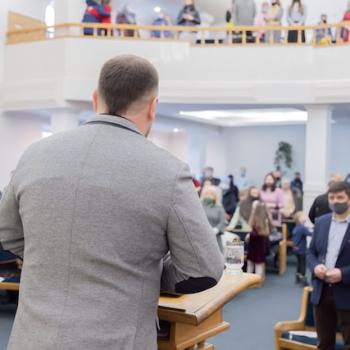I’ve met a bunch of new-to-me people at church recently and have had the chance to hear a bit about where they’re coming from. I’m grateful for it. And I find myself telling myself this: It’s okay that we’re different.
It’s okay that we’re thinking about things differently. It’s okay that we come from different backgrounds and have had different experiences of church. It’s okay that we’re all at our current church for different reasons.

Everyone Wants Ethnic Diversity, But Do We Want Diversity of Thought?
One thing I’ve heard from lots and lots of people who go to my church is that they’re here, at least in part, because the church is genuinely, deeply multiethnic.
I’m not saying we have everything figured out as far as being a multiethnic church goes. Far from it.
But if you look around on a Sunday morning, you’ll likely see white faces, Pacific Islander faces, Black faces, Asian and Asian American faces, a couple of Latinx faces. A lot of white faces, to be fair. But a lot of non-white faces too.
This is attractive—perhaps especially to those who have had less-than-fantastic experiences in ethnic-specific churches (including predominantly white churches) in the past. And to anyone who believes communities are stronger when we all bring our different perspectives and gifts to the table.
Our desire to be a multiethnic church is something that tends to unite us. But race isn’t the only difference we have. As I’ve heard people talk about what brought them to our church, it’s been clear to me that we have all sorts of differences in how we think about things. Even (or sometimes especially?) within the same racial or ethnic groups.
I realized that, while I find it easy to see that there is great strength and value in being a multiethnic community (even though cross-cultural communication is often difficult and messy), sometimes I find it harder to see that our differences in thought also hold potential for strength and value.
“Faith is a Practice” Has Implications for How We See One Another
In a previous post, I reflected on how I see faith more as a set of practices to embody together in community than a series of beliefs to sign off on. (In productive tension with the reality that sometimes clarity of belief is important—so important.)
In those two posts, I focused on church belief statements and the impact they have. What can faith communities look like without church structures and leaders feeling the need to impose one set of beliefs on us all?
In this post, in contrast, I’m thinking less about leaders, authority, statements, and requirements for belonging in a community, and more about our everyday attitudes and postures toward one another. Less of a top-down enforcement of belief, and more of a peer-to-peer question of how we exist together in community across our differences.
If faith really is more of a practice than a set of beliefs, then my neighbor who has had different church experiences and approaches church differently from the way I do is still someone I can be in faith community with. It’s okay that we’re different.
We can see each other as equals. Learn from one another. Practice faith together. Grow together. Make room for one another to be our full selves at church.
Difference Does Not Need to Spark an Attempt to Control
Sometimes when we notice someone thinking differently from the way we think, we might feel an urge to exercise control. Some alarm bells might go off in the back of our minds, unbidden; we might feel threatened by the difference, or at least unnerved by it.
We might react by wanting to make that person change. But while changing our minds is often a good thing, like most good things, it cannot be forced. It can’t be coerced.
It has to happen naturally, at its own pace—at the person who changes their mind’s own pace. We can—and should, I think—voice our own views openly, but not in a way that pressures anyone else to agree with them. And not in a way that holds out love and friendship until the other person agrees with us.
Maybe as we articulate our own thoughts, something will stick with someone. Maybe something will provoke thought. We can hope for these things.
But our ultimate aim is simply to be our full honest selves—and let that impact others as it will. Not to convince. Not to change others. Not to control.
Difference Does Not Need to Spark Insecurity
On the flip side, sometimes we notice the different ways we’re thinking about things, and we might wonder if we are wrong and need to change.
Especially if someone articulates their views particularly confidently—and we don’t necessarily feel confident ourselves—we may feel insecure. After all, as I reflected last week in my blog, most of us, much of the time, are walking heaps of insecurities.
At a church I used to be a part of, I felt very often that I held a minority view on many different issues. Because of that, I often did not feel safe to speak up. Sometimes I wondered if I was wrong. Everyone else seemed so sure. There was safety, for them, in numbers.
Looking back, I wish I had spoken up more. It would not have been easy, and in some cases people would likely not have responded well. But my views were no less valid, interesting, or meaningful because I seemed to be the only one who held them.
I didn’t need to feel insecure about the things I was thinking. I didn’t need to conform. If others had been open to it, the group would have been strengthened by hearing where I was coming from.
It’s Good That We’re Different
I’m trying to unlearn the deeply-ingrained feeling that people in churches should generally agree on most things and think the same way about most things. There’s something about difference that can feel threatening, but it doesn’t have to be. It can be joyful.
Just by being our full selves and being honest about what we think, we can challenge one another and help one another grow in some really healthy ways.
So, I keep telling myself this: It’s okay that we’re different. Or, more strongly: It’s good that we’re different.
It’s good that we’re thinking about things differently. It’s good that we come from different backgrounds and have had different experiences of church. It’s good that we’re all at our current church for different reasons.
We do not need to conform to one another’s ways of seeing things. We do not need to control or change one another—or to feel insecure and feel like we have to change. We can let transformation happen in its own time, in its own way, as God’s Spirit of love and justice leads.
We can do this together, as equals—each free to be our honest selves and committed to making room for others to do the same.












